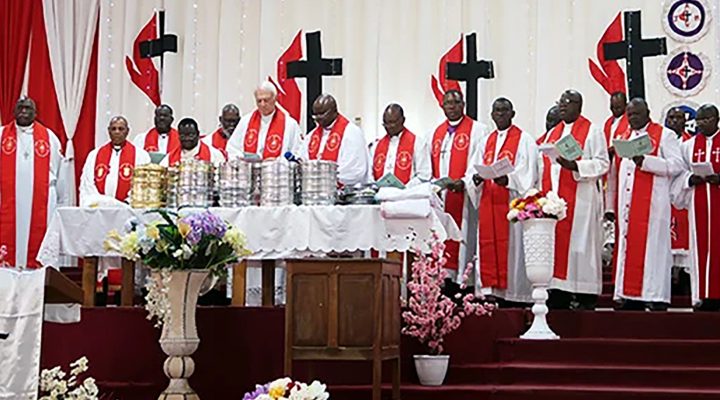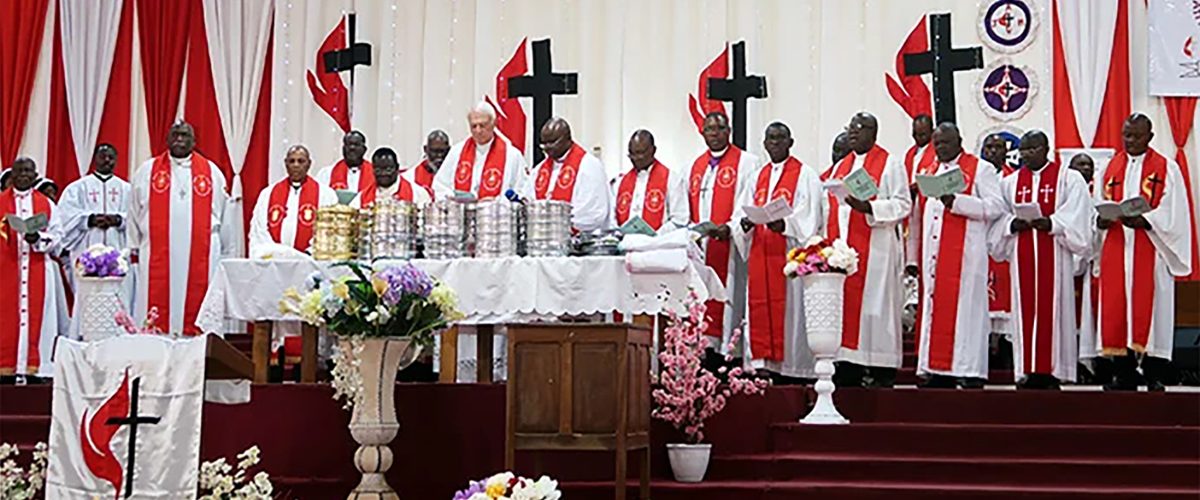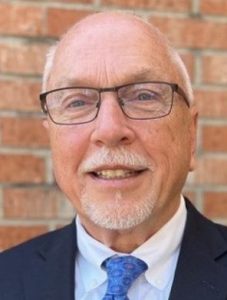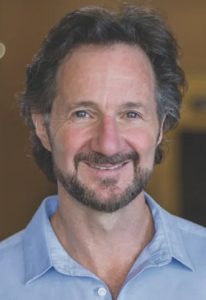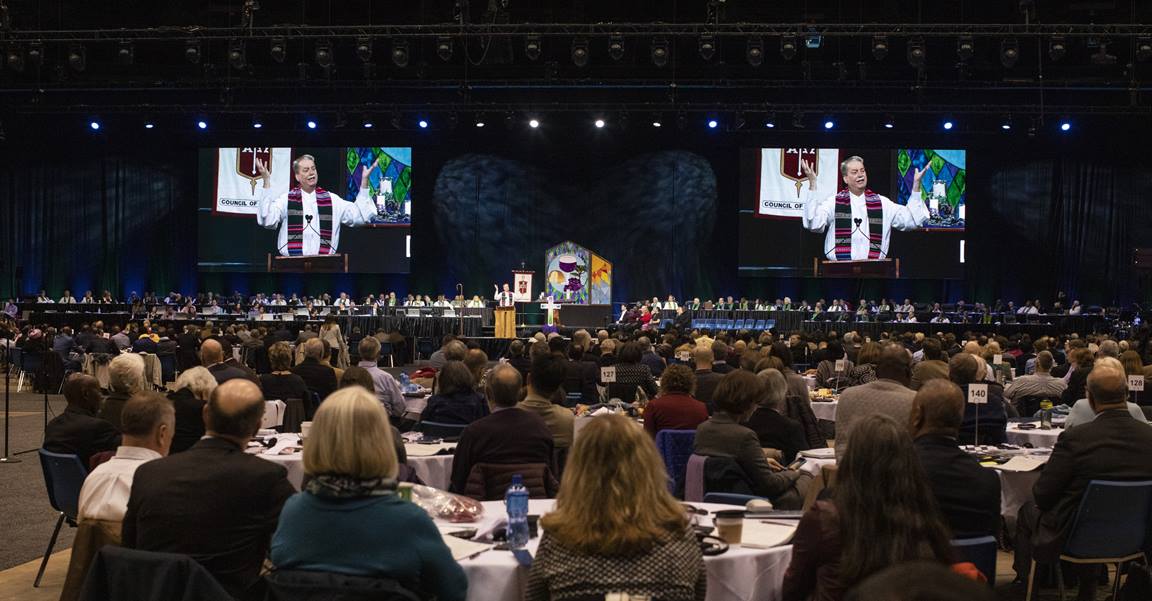Hope and jubilation were palpable at the United Methodist General Conference in Spring 2024. Conservative forces that had hammered away at the denomination for more than half a century had decamped, unfortunately taking with them more than 7,600 local congregations, not all of which joined in a new denomination.
In the months following the momentous 2020/2024 General Conference, United Methodists’ sense of relief began to give way to new trepidations. Having lost the 52-year-old battle to keep LGBTQ people out of ordained ministry and away from church weddings, conservative or “traditionalist” forces trained their sights on a new war: preventing passage of the constitutional amendments that will grant more authority for regions of the worldwide United Methodist Church to set their own standards on ordination and marriage.
United Methodists’ new battleground centers in Africa, where annual (regional) conferences are beginning to vote on regionalization, the structural change granting greater local autonomy that progressive leaders in the U.S., the Philippines and Western Europe hoped would placate those still opposed to LGBTQ inclusion. Those votes are to occur throughout 2025, but the results won’t be announced until all annual conferences have voted.
“Conservative forces have ramped up disinformation campaigns.”
Conservative forces have ramped up disinformation campaigns, spreading lies that the UMC had become a “gay church” for removing its half-century-old discriminations against LGBTQ people. Those official policies hung on a definition in a set of Christian living guidelines known as the Social Principles stating that “homosexual practice is incompatible with Christian teaching.”
Social Principles
The new Social Principles that take effect in January 2025 make only a few mentions of human sexuality, but a new section defines marriage as a covenant between a man and a woman or between two adults of consenting age. The new definition of marriage is intended “to allow it to work under the marriage laws of all countries in the UMC,” wrote Taylor W. Burton Edwards in a recap of General Conference action. The definition also provides “clear language against child marriage and polygamy, with guidance on how to deal with each where it has occurred.”
It’s the “or” that conservatives have made their new battleground, even though changes enacted in May will give church regions the authority to set their own marriage and ordination standards if ratified in the coming year.
The current disinformation campaign has resulted in messy public confrontations in Zimbabwe, Nigeria and Liberia. Conflicts have turned life-threatening at times, as United Methodist bishops in all three countries have been accosted while attempting to administer church policies. In Liberia and Nigeria, bishops were physically threatened.
Wesleyan Covenant Association
The Wesleyan Covenant Association, founded in 2016, masterminds the latest round of turbulence. Originally founded in 2016 as another unofficial “reform and renewal” lobby, the WCA evolved into a body that gave birth to the breakaway Global Methodist Church, which held its first General Conference in September 2024 in Costa Rica.
Now that the new church has formally started, President Scott Field recently announced the WCA has changed its mission: “In light of decisions by the General Conference of the United Methodist Church (2020/2024), and the vibrant growth of the Global Methodist Church since its launch in 2022, the Wesleyan Covenant Association is focusing its mission to act as advocate and ally on behalf of churches globally that seek pathways out of the United Methodist Church and into the Global Methodist Church.”
In other words, even after enticing more than 7,600 churches to “disaffiliate,” the WCA aims to dismantle the remainder of the United Methodist Church.
The Africa Initiative has been the WCA’s sledgehammer to bludgeon African United Methodists into repudiating the UMC because of the removal of its anti-LGBTQ discrimination.
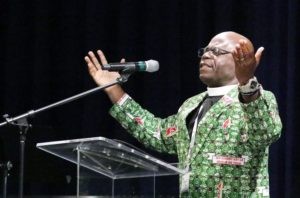
Jerry Kulah, Liberia, speaks to the global legislative assembly of the Wesleyan Covenant Association Nov. 2, 2019. (Photo by Thomas Kim, UMNS.)
Jerry Kulah, a Liberian pastor who has served as the Africa Initiative’s coordinator, was suspended from active ministry in early December on charges that he has promoted the Global Methodist Church’s agenda and undermined the authority of the church by fomenting protests against UMC Bishop Samuel J. Quire. The bishop previously had suspended at least two other pastors for agitating to hold a special session of the Liberian Annual Conference to vote on disaffiliation. In one instance, Bishop Quire had to be extracted from a church meeting when protesters attacked his car.
Ironically, the conflict in Liberia pits two half-brothers who are both United Methodist leaders against one another in the struggle over perceptions of the church’s new definition of marriage. Retired Bishop Arthur F. Kulah, an elder brother of Jerry Kulah, has stated unequivocally that the UMC is not now “a gay church,” according to an article by Naneka A. Hoffman in New Dawn Liberia.
More than one counter group emerged since the WCA was founded. Most prominent among them are the United Methodist Africa Forum and Africa Voice of Unity.
Zambian pastor Gabriel Mususwa Banga, UMAF general secretary, issued an impassioned statement in early December calling for African United Methodists to beware of misrepresentations by Africa Initiative supporters. Titled “They Are Here Again Camouflaged in Sheepskin,” his essay urged African United Methodists to reject WCA’s characterization of the UMC as “a gay church.”
On Dec. 8, the West Africa Central (regional) Conference dealt a heavy blow to WCA forces when delegates elected pastor Ande Ikimun Emmanuel as bishop. Emmanuel was a co-convenor of Africa Voice of Unity and has been a vocal UMC supporter. He was assigned as bishop of the Nigeria Episcopal Area, where for more than a decade he has attempted to counter documented harassment of pro-UMC pastors by then-bishop John Wesley Yohanna, a strident LGBTQ opponent.
Along with his cabinet, Yohanna resigned from the UMC in July to join the Global Methodist Church, but thanks to a legal injunction has been unable to claim sought-after United Methodist property. In an interview after his election, Emmanuel said his first goal as Nigeria’s new bishop is to foster unity in the church.
Good News folds
While the WCA carries forward the banner of division, a longtime player in UMC politics has left the battlefield.
Good News, a conservative advocacy organization formally known as A Forum for Scriptural Christianity Inc., announced in September it was disbanding because, with the rise of the Global Methodist Church, “its work is done,” as its president, Rob Renfroe, and executive vice president, Thomas Lambrecht, said in a joint editorial.
Good News was founded in 1967 by a conservative Methodist pastor, Charles Keysor. Committed to literalist biblical interpretation coupled with patristic theology and tapping into growing backlash against LGBTQ rights, Keysor and his original 12 directors were successful at getting the “incompatible” language added to the Social Principles in a last-minute floor vote at the 1972 General Conference.
For 57 years, Good News was the standard-bearer for anti-LGBTQ forces in the UMC. When Keysor left the UMC, he was succeeded as Good News president by James V. Heidinger II, who in turned was succeeded by Renfroe and Lambrecht. Its official history on the Good News website styles the organization as a group for “spiritual renewal” of the UMC.
Outside the organization, however, Good News was known for one thing: opposition to progressive theologies and practices, especially LGBTQ inclusion in the United Methodist Church. Its banner was the “incompatible” language in the Social Principles.
Good News habitually glossed over the fact that the Social Principles were meant as voluntary guidelines and weren’t considered official United Methodist law or doctrine. Instead, Good News adherents lobbied General Conference delegates to insert rules and penalties into enforceable parts of the Discipline such as qualifications for ordained ministry. Well-funded by donors, Good News held information breakfasts and orientation sessions for delegates, especially the growing cadre of African delegates.
Good News also went after the money.
From the mid-1980s through 2016, the Discipline read: “To ensure that no annual conference board, agency, committee, commission, or council shall give United Methodist funds to any gay caucus or group, or otherwise use such funds to promote the acceptance of homosexuality or violate the expressed commitment of The UMC ‘not to reject or condemn lesbian and gay members and friends’ The council shall have the right to stop such expenditures.”
In 1996, when same-sex commitment ceremonies were trending, a new restriction was added to the Discipline: No United Methodist pastor could preside at a same-sex wedding, nor could such ceremonies be held in United Methodist churches. Even after same-sex marriage was authorized by the U.S. Supreme Court in 2015, traditionalist delegates to General Conference held firm against allowing LGBTQ people to have their unions blessed by the church or its pastors.
The last hurrah
The final political hurrah for UMC conservatives was the Special Called General Conference in February 2019 in cold, snowy St. Louis, Mo. The conclave was intended to resolve the issue of “human sexuality” once and for all. A proposal known as the One Church Initiative, which would have granted local autonomy for churches and annual conferences to decide LGBTQ inclusion for themselves, went down to defeat. The conservative proposal known as the Traditional Plan, with included harsh penalties for violation of the UMC’s anti-LGBTQ policies, was voted in by a margin of 58 votes.
Those 58 votes proved telling. Not only were at least four of the electronic ballots subsequently found to be fraudulent, but they also signaled the power and influence of Good News and its companions was failing among United Methodist leaders. People were just plain tired of the fight. Additionally, more pastors, families and co-workers had discovered LGBTQ people aren’t the predatory sexual deviants Good News, the IRD and others claimed they were.
The 2019 General Conference votes also signaled to progressive forces that despite the One Church Plan’s defeat, the time was ripe to overturn the UMC’s official discrimination against LGBTQ people, even if it meant splitting the denomination.
During 2019 U.S. annual conference sessions, which occurred after the special conclave, nearly 75% of UMC regional units elected new, progressive delegates to the 2020 General Conference. They also issued statements repudiating the Traditional Plan. The intention was clear: Rank-and-file clergy and church members wanted to overturn the harsher rules.
Traditionalists were gobsmacked by the 2019 delegate votes. Their strategy to maintain power by tightening the screws on LGBTQ discrimination blew up in their faces. It looked like the 2020 General Conference slated for Minneapolis would be the last bloody battle of the half-century-old war.
Then came COVID
Then came something utterly unexpected: a global coronavirus pandemic. General Conference was postponed to 2022. Then to 2023. Then to 2024.
In 2022, the Wesleyan Covenant Association, led by attorney-turned-clergyman Keith Boyette, announced that in its ire at the succession of postponements which had derailed an amicable separation, it would form a new denomination, the Global Methodist Church. Throughout 2023, WCA adherents lobbied — deceptively, as many church leaders documented — for United Methodist congregations to leave the denomination using a provision adopted in 2019 that traditionalists thought would encourage progressives to leave. Once again, the conservative strategy backfired, as few progressive churches left from 2019 to 2023, while the bulk of the departures during that five-year-period were predominantly white and rural, led by male pastors frequently lacking seminary education, according to a report by senior researcher Lovett H. Weems Jr. of the Lewis Center for Church Leadership.
Even though it has its own church now, the WCA is waging a new campaign based on the battle plans laid out originally by Good News. Although wounded by five years of disaffiliations, UMC leaders are pressing forward to create an institutionally leaner and more inclusive church. With actions such as suspension of agitating pastors and election of unity-focused bishops, signs are that United Methodist leaders aren’t going to tolerate the past’s turmoil anymore.
Cynthia B. Astle has reported on The United Methodist Church at all levels since 1988.
Related articles:
UMC faces turbulence after removing LGBTQ bans
UMC General Conference removes much of LGBTQ restrictions in consensus vote

